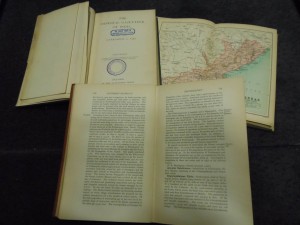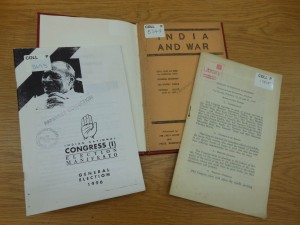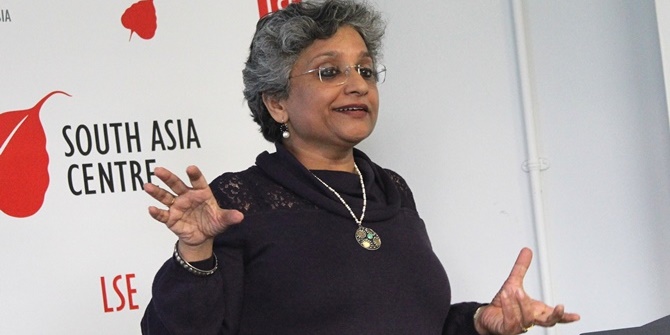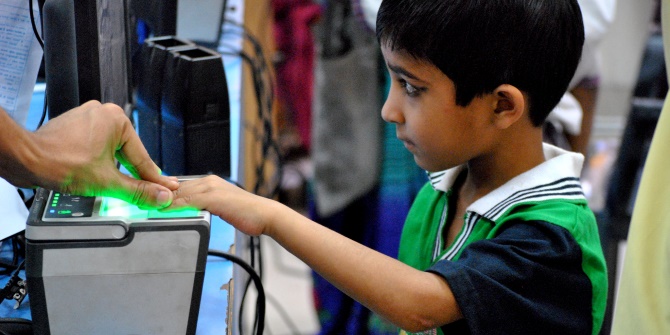LSE Library has extensive holdings relating to India, particularly primary material both historic and more recent. This is the first of two posts highlighting collections in the Library that may be of interest to researchers at LSE and beyond. This first post highlights historical material while the second will look at the recent statistical resources available from the Library.
The LSE Library’s early collections owe much to its founder, Sidney Webb. In the document he drafted for the “Proposed establishment of a library of Political Science” he stated that the Library “would set itself to acquire a systematic collection of all available material bearing on the structure and function of public administration … in all parts of the world…”
It would have been difficult to systematically gather Indian material due to the distances involved and the communication networks available at the time. However, there are many items from the late nineteenth and early twentieth century relating to a wide range of subjects, including the civil service, famine relief, the penal code and the railways. Among the older governmental journal titles there are a lot of economic titles such as the India Trade Journal, which dates from 1905. The Library also holds acts and legislation, some of which date back to 1834.
The wealth of material in the collection somewhat mitigates the lack of systematic collection. For example, the Imperial Gazetteer, which goes back as far as 1885, has volumes on particular Indian regions with information on the physical nature of the area, its history, population, agriculture, mines, arts, communications, government, education, crime, medical facilities and more. Additionally, the Library holds distinct reports from individual provinces on some of these areas. These two collections thus complement each other and often one fills in gaps in the other.
One of the main collection principles underlying the early years of the Library is the importance of primary source material, including government publications. When the Director W.A.S. Hewins reported to the Governors in July 1902 on the contents of the Library, he stated that the collection of official documents could be regarded as the backbone of the Library. At that time it was also by far the most frequently used collection.
There is also a large selection of official publications relating to the pre-1947 provinces of India. The collections for the provinces are not uniform, but there are some common themes: there are codes for many provinces, dating back to the late nineteenth century, detailing local laws and regulations. Library holdings also include significant literature on administration; for example, researchers interested in the Central Provinces can consult the “Triennium report of the general administration of the Province” and the “Report on the administration of the Central Provinces”.
There are reports from all the provinces from the late nineteenth century onwards on a range of subjects, but the particular focus is on sanitation, trade and justice; holdings include the “Sanitary Reports” from the Central Provinces and the Bombay-published “Civil and Criminal Justice”. There are also extensive records relating to excise and revenue and import and export taxes, again from the late nineteenth century in some provinces.
The Library also holds over 90,000 pamphlets, many published in the nineteenth century or the early part of the twentieth century. This is primary source material, published and written by pressure groups, political parties and individual campaigners and is therefore a unique resource for historical research. Much of the original collection was donated to the Library in its early years. There are hundreds covering India at the time it was a British colony and when it gained independence, preceding the partition of the Indian subcontinent. There are also numerous pamphlets relating to Indian political parties, both pre-independence and later, as the Library has continued to collect pamphlets on India.
Searching for the names of political parties – for example, Indian National Congress (INC) or India League – can yield interesting results. Publications from the INC include not only pamphlets but also reports, journals, newsletters and collections of presidential addresses.
All these items are individually listed on the Library catalogue and offer a great wealth of information for researchers onIndia seeking to contextualise their work with a historical perspective.
Ellen Wilkinson is an Academic Support Librarian at the LSE Library.









